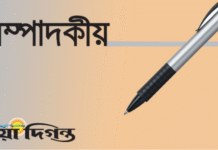
The election campaign by Narendra Modi of the Hindu nationalist Bharatiya Janata Party (BJP) to become India’s next prime minister is ruffling feathers across the subcontinent in Bangladesh.
Under its current Congress-led government, India has been more supportive than most nations towards Sheikh Hasina’s Awami League administration in Dhaka and its contentious victory in Bangladesh’s general election, which was boycotted by the opposition. The opposition Bangladesh Nationalist Party (BNP) was left weakened and directionless.
But now Modi has given the BNP a political cause to rally around with the brusque comments he made about Bangladeshi migrants in his battle with Mamata Banerjee, the chief minister of the adjoining Indian state of West Bengal and leader of the Trinamool Congress Party (TMC).
“You can write it down. After May 16 [the day India’s election results are announced], these Bangladeshis had better be prepared with their bags packed,” Modi told a West Bengal election rally.
Accusing Ms Banerjee’s TMC party of using Bangladeshi migrants as a “vote bank”, he said: “You are spreading the red carpet for vote bank politics. If people come from Bihar, they are outsiders to you. If people come from Odisha, they are outsiders to you. But if some Bangladeshi comes, your face seems to shine. This country cannot run like this. We won’t allow you to destroy the country for the sake of your vote bank politics.”
Modi’s statements have angered Bangladeshis, aroused anti-Indian sentiments and been a boon to the BNP, according to Zafar Sobhan, editor of the Dhaka Tribune. “The BNP will definitely see this as an opportunity,” perhaps to resume protests against the government, notes Sobhan.
It is not that anyone denies that here are millions of Bangladeshis who have migrated, legally and illegally, across the border into India. There may be as many as 10m Bangladeshis in India today. But there are plenty of sore points in the relationship between the two countries besides the fate of Bangladeshi migrants.
One is water. In the Ganges delta, the two countries share dozens of rivers flowing from India into Bangladesh and on to the Bay of Bengal. To the annoyance of New Delhi as well as Dhaka, West Bengal’s Banerjee scuppered a deal to share the waters of the Teesta river agreed when Sheikh Hasina made a much vaunted trip to Delhi in 2010.
This is politically significant in Bangladesh in part because Hasina’s Awami League (AL) is supposed to have a special relationship with India’s incumbent Congress party, based on the two parties’ shared secular ideals and the support given to the AL by Indira Gandhi, the late Congress prime minister and grandmother of current Congress figurehead Rahul Gandhi.
Hasina’s father, Mujibur Rahman, became the first president of Bangladesh after Indira Gandhi defeated Pakistan’s forces and helped Bangladesh (then East Pakistan) gain independence from Islamabad in 1971.
The Teesta controversy has undermined the credibility of the AL and added to the sense among Bangladeshis that the “special relationship” with India is one-sided. BNP and the Left Front activists have recently marched to the border to protest about the failure to implement the deal.
Another problem is cows, which are dear to the devoutly Hindu Modi. Some 1,000 people have been killed on the border between the two countries over the past decade, largely because of skirmishes over the smuggling of cows from India into Bangladesh for slaughter. In much of India it is illegal to slaughter cows, but the meat is prized in majority Muslim Bangladesh.
Then there is the politics. India’s Congress-led coalition stood by the AL even as it ignored opposition attempts to secure a fair election through the installation of a neutral interim government.
“People perceive [Indian support for the AL] as an affront to our sanity,” says Shamsher Chowdhury, a former foreign minister and senior BNP figure. Sheikh Hasina’s government, he says, is not in power because of the popular vote but because it has been supported by a foreign government. India, according to Mr Chowdhury, “has to come to terms with the reality, which is that there isn’t a huge amount of good will, despite 1971.”
With India under Congress already distrusted by some Bangladeshis, it is unclear how much a BJP government led by Modi would change the relationship. For all his rhetoric about Bangladeshi immigrants in West Bengal, Modi may need to entice Banerjee and her Trinamool Congress party into an electoral alliance to secure a stable coalition. .
And few in New Delhi – from Congress or the BJP – were anything other than relieved when Bangladesh convicted former intelligence officers and others for attempting to smuggle millions of dollars worth of small arms to Indian separatist rebels in its restive northeast (allegedly from Pakistani sources). Fourteen were condemned to death.
Whatever happens under Modi or any other future prime minister, India’s policy towards its immediate neighbours is likely to remain a messy affair.
Source: Beyondbrics









